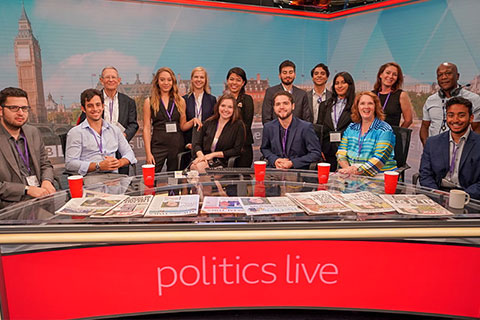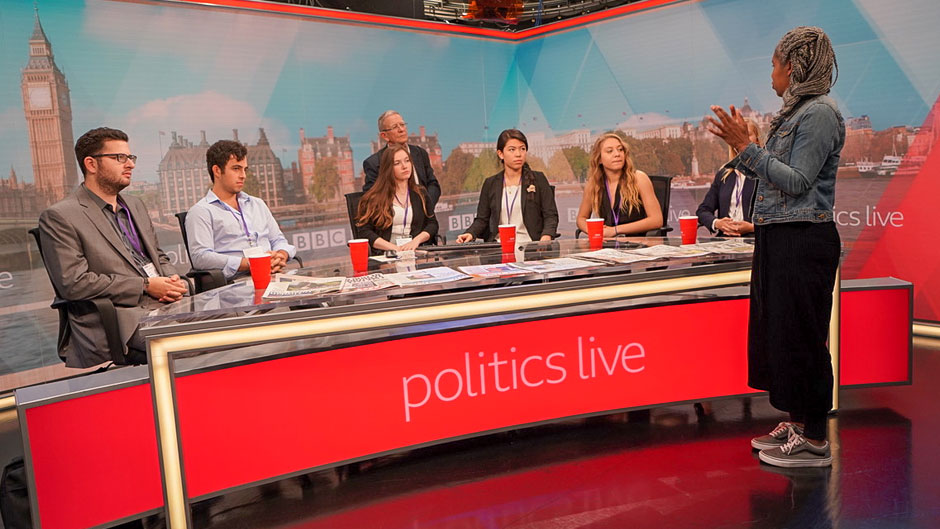LONDON — Walking past Parliament, Nicolas Sampedro and other University of Miami students saw a man in a clown suit wearing a mask of Boris Johnson, who was just days away from becoming the next British prime minister.
Tall, thin banners flapped in the breeze. “Britain Has Changed Its Mind,” read one. “Stop Brexit,” said another.
A man in a lawn chair held a sign saying: “Boris Johnson is a clone of Donald Trump.”
“I was witnessing history,” said Sampedro, a junior studying public relations.
Sampedro was one of a dozen UM students taking part in the three-week global communications program, which coincided with one of the most intense periods in British politics. A new prime minister was being elected and Britain was rushing into a new chapter in its four-year-long struggle to break away from the European Union.
“I felt a lot of excitement and tension,” said Nihar Mandapaty, a junior majoring in music. “Some people talked about Brexit like it was the end of the world. Others said it was the next best thing: England is going to finally have its freedom, it’s going to be independent, have its own say.”
Understanding Brexit – Britain’s effort to exit the European Union – can be challenging.
“On Day One, I was totally confused,” said Anneke Schole, a junior studying advertising. But after three weeks in London she said, somewhat facetiously: “Now, I’m an expert.”
Here’s how Schole sums up Brexit: Boris Johnson, the former mayor of London, was a leader of a campaign that ended in 2016 with England voting 52 percent to 48 percent to break away from the European Union. Former Prime Minister Theresa May tried repeatedly to carry out that mandate. She failed and resigned. Her Conservative Party conducted an election to replace her. Johnson won and is now prime minister.
The vote on Brexit had been open to all of Britain’s 8 million registered voters. But the election that brought Johnson to victory was restricted to the 160,000 members of the Conservative Party. That meant that less than 2 percent of Britain’s voters decided who would lead the country, effectively a closed primary by American standards.
That puzzled the Miami students.
“It’s so weird that only the party members could vote,” said Keara Moon, a junior studying media management and public relations.
The limited vote left many in Britain feeling disenfranchised.
“Since the election,” Moon said, “I’ve seen the hashtag ‘#NotMyPrimeMinister’ everywhere.”
 The students learned about global communication from executives and staff members at 15 media, public relations and advertising companies, including Buzzfeed; the BBC; Politico; Bloomberg; the Daily Express; the Associated Press; CNN; The Wall Street Journal; Saatchi & Saatchi, Burson, Cohn & Wolfe; Edelman; Mercury; and Ogilvy. They also took a train to Liverpool to talk with senior PR executives at the Liverpool Football Club and at the Beatles Experience museum.
The students learned about global communication from executives and staff members at 15 media, public relations and advertising companies, including Buzzfeed; the BBC; Politico; Bloomberg; the Daily Express; the Associated Press; CNN; The Wall Street Journal; Saatchi & Saatchi, Burson, Cohn & Wolfe; Edelman; Mercury; and Ogilvy. They also took a train to Liverpool to talk with senior PR executives at the Liverpool Football Club and at the Beatles Experience museum.
Jack Blanchard, a reporter for Politico, talked with the students about his work covering Parliament. “He gave us unbiased, ear-to-the-ground stories,” said Marisa Hightower, who was completing her master’s degree in communication studies. “He had just had dinner with Boris Johnson.”
At the BBC, the students sat in the control room during a broadcast of “Politics Live,” a daily 45-minute program in studios within sight of Parliament.
Johnson has promised to leave the European Union on Oct. 31 whether or not he is able to negotiate an agreement. An abrupt break will leave Britain without guidelines to deal with border controls, immigration, trade and hundreds of other issues.
Margot Mather, a sophomore majoring in journalism, had studied Brexit in a political science class in Miami and written a 20-page paper on the situation.
“It’s one thing to write a research paper and another to experience it in person,” she said. “Seeing it from the PR firms’ and journalists’ angles in London opened my eyes. Even though they are experts, they are grappling with it.”
Some students said that before joining the London program, they hadn’t thought much about Britain leaving the European Union or who was prime minister.
“I wasn’t into it,” said Schole. “I’m now weirdly passionate about it.”
UM Summer in London, led by Professors Heidi Carr and Joseph B. Treaster of the School of Communication, is open to undergraduate and graduate students in all majors. In 2020, the program will run from July 3 through July 25. For details on how to sign up e-mail h.carr@miami.edu and treaster@miami.edu. To learn more about study abroad programs at UM, visit the Study Abroad website at https://studyabroad.miami.edu/

